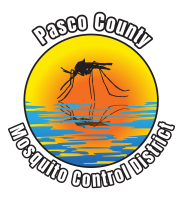Entomology
PCMCD employs four medical entomologists. The District works with state universities, private industry, and government agencies to research cutting edge mosquito control technologies. Organizations that have worked with PCMCD include but are not limited to: The University of Florida, Florida A&M University, The University of South Florida, United States Department of Agriculture, Navy Entomology Center of Excellence, and the World Health Organization.

District research and development programs are focused on functional research that helps to improve control strategies. The efforts are designed to evaluate the efficacy of new commercial products, evaluate the efficacy of application techniques and equipment, and develop novel insecticide and herbicide delivery systems. A number of insecticides, application equipment and techniques now in world-wide use were originally tested or developed in Pasco County by District personnel. Additionally, we’ve assisted several pesticide manufacturers in evaluating products in the field to gather the data necessary for bringing their products to market. The District strives to stay abreast of new technologies and innovative approaches in our industry.
PCMCD entomologists conduct routine trapping or surveillance of the many mosquito species inhabiting Pasco County. The traps set throughout the county are essential for determining mosquito presence and behavior. Mosquitoes caught in the evening are collected and transported to the laboratory each morning where they are carefully identified to species. This abundance data is useful to our lavicide technicians, as the species identification informs them what habitats to focus on to pinpoint the breeding sources. The data is also essential for guiding targeted UlV adulticiding missions as well as assessing their effect.
To assure that the materials used by PCMCD remain effective and work to their best advantage, it is important to monitor mosquito populations for resistance to these products using bioassays. To do this, mosquito eggs and larvae are collected from the wild, reared to the larval or adult stage then treated with known concentrations of insecticides and compared to lab-reared naive populations. These bioassays determine and monitor the susceptibility of Pasco County mosquitoes to each insecticide used by the District. In this way, the minimum dosage necessary for adequate control is determined and staff us able to monitor and detect when resistance to a particular insecticide is developing.
